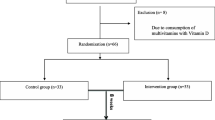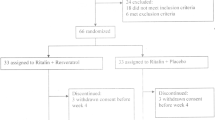Abstract
Background
In this research the symptom improvement of attention-deficit hyperactivity disorder (ADHD) of children was assessed by oral vitamin D administration in Tabriz, Iran.
Methods
In this double-blind, randomized clinical trials, 96 children (2–18 years) were enrolled to placebo and vitamin D groups. Children took vitamin D pearl (50,000 IU/week) or placebo for 6 weeks. Children, who had the change in methylphenidate dosage and received any anticonvulsants and corticosteroids were excluded from the research. ADHD symptoms were diagnosed by Conners parent rating scale (CPRS) test at baseline and after intervention. ADHD Conners divided into inattention (IA), hyperactivity/impulsivity (H/I) and combination type (C) subscales. Vitamin D serum level was assessed at baseline and after 8 weeks in both groups.
Results
The differences between CPRS and its subscales were not significant at baseline (P > 0.05). The Conners IA score was decreased in vitamin D group (P < 0.05; adjusted with age and baseline values). ADHD Conners and all subscale scores reduced remarkably after intervention in patients with insufficient level of vitamin D compared to placebo (P < 0.05).
Conclusions
Oral vitamin D improved ADHD symptoms with a particular effect on inattention symptoms. In addition, symptoms related to all subscales were improved remarkably in patients with insufficient level of vitamin D. Vitamin D treatment in children with ADHD could be considered due to the expand benefit of vitamin D in body.

Similar content being viewed by others
References
Catalá-López F, Peiró S, Ridao M, Sanfélix-Gimeno G, Gènova-Maleras R, Catalá MA. Prevalence of attention deficit hyperactivity disorder among children and adolescents in Spain: a systematic review and meta-analysis of epidemiological studies. BMC Psychiatry. 2012;12:168.
Hodgkins P, Setyawan J, Mitra D, Davis K, Quintero J, Fridman M, et al. Management of ADHD in children across Europe: patient demographics, physician characteristics and treatment patterns. Eur J Pediatr. 2013;172:895–906.
Landaas ET, Aarsland TIM, Ulvik A, Halmøy A, Ueland PM, Haavik J. Vitamin levels in adults with ADHD. BJPsych Open. 2016;2:377–84.
Faraone SV, Biederman J, Milberger S. An exploratory study of ADHD among second-degree relatives of ADHD children. Biol Psychiatry. 1994;35:398–402.
Chhabildas N, Pennington BF, Willcutt EG. A comparison of the neuropsychological profiles of the DSM-IV subtypes of ADHD. J Abnorm Child Psychol. 2001;29:529–40.
Goksugur SB, Tufan AE, Semiz M, Gunes C, Bekdas M, Tosun M, et al. Vitamin D status in children with attention-deficit–hyperactivity disorder. Pediatr Int. 2014;56:515–9.
Mohammadpour N, Jazayeri S, Tehrani-Doost M, Djalali M, Hosseini M, Effatpanah M, et al. Effect of vitamin D supplementation as adjunctive therapy to methylphenidate on ADHD symptoms: a randomized, double blind, placebo-controlled trial. Nutr Neurosci. 2018;21:202–9.
Sharif MR, Madani M, Tabatabaei F, Tabatabaee Z. The relationship between serum vitamin D level and attention deficit hyperactivity disorder. Iran J Child Neurol. 2015;9:48–53.
Grant WB, Holick MF. Benefits and requirements of vitamin D for optimal health: a review. Altern Med Rev. 2005;10:94–111.
Rosen CJ, Adams JS, Bikle DD, Black DM, Demay MB, Manson JE, et al. The nonskeletal effects of vitamin D: an Endocrine Society scientific statement. Endocr Rev. 2012;33:456–92.
Kamal M, Bener A, Ehlayel MS. Is high prevalence of vitamin D deficiency a correlate for attention deficit hyperactivity disorder? Atten Defic Hyperact Disord. 2014;6:73–8.
Eyles D, Feron F, Cui X, Kesby J, Harms L, Ko P, et al. Developmental vitamin D deficiency causes abnormal brain development. Psychoneuroendocrinology. 2009;34(Suppl 1):S247–57.
Neyestani TR, Hajifaraji M, Omidvar N, Eshraghian MR, Shariatzadeh N, Kalayi A, et al. High prevalence of vitamin D deficiency in school-age children in Tehran, 2008: a red alert. Public Health Nutr. 2012;15:324–30.
Conners CK, Sitarenios G, Parker JD, Epstein JN. The revised Conners’ Parent Rating Scale (CPRS-R): factor structure, reliability, and criterion validity. J Abnorm Child Psychol. 1998;26:257–68.
Meyer T, Becker A, Sundermann J, Rothenberger A, Herrmann-Lingen C. Attention deficit-hyperactivity disorder is associated with reduced blood pressure and serum vitamin D levels: results from the nationwide German Health Interview and Examination Survey for Children and Adolescents (KiGGS). Eur Child Adolesc Psychiatry. 2017;26:165–75.
Shang-Guan LL, Zhao YR. Serum levels of 25-hydroxyvitamin D in children with attention deficit hyperactivity disorder. Zhongguo Dang Dai Er Ke Za Zhi. 2015;17:837–40 (in Chinese).
Noorazar G, Mehdizadeh G, Ghaffari A, Dehbokri N, Khodayari MT, Ghaffary S. Association between level of vitamin D with environmental and bioelement factors in children with attention deficit hyperactivity disorder (ADHD). Pharm Sci. 2018;24:193–8.
Morales E, Julvez J, Torrent M, Ballester F, Rodríguez-Bernal CL, Andiarena A, et al. Vitamin D in pregnancy and attention deficit hyperactivity disorder-like symptoms in childhood. Epidemiology. 2015;26:458–65.
Strøm M, Halldorsson TI, Hansen S, Granström C, Maslova E, Petersen SB, et al. Vitamin D measured in maternal serum and offspring neurodevelopmental outcomes: a prospective study with long-term follow-up. Ann Nutr Metab. 2014;64:254–61.
Gustafsson P, Rylander L, Lindh CH, Jönsson BA, Ode A, Olofsson P, et al. Vitamin D status at birth and future risk of attention deficit/hyperactivity disorder (ADHD). PLoS One. 2015;10:e0140164.
Burne TH, Becker A, Brown J, Eyles DW, Mackay-Sim A, McGrath JJ. Transient prenatal Vitamin D deficiency is associated with hyperlocomotion in adult rats. Behav Brain Res. 2004;154:549–55.
Ubbenhorst A, Striebich S, Lang F, Lang UE. Exploring the relationship between vitamin D and basic personality traits. Psychopharmacology. 2011;215:733–7.
Tolppanen AM, Sayers A, Fraser WD, Lewis G, Zammit S, Lawlor DA. The association of 25-hydroxyvitamin D3 and D2 with behavioural problems in childhood. PLoS One. 2012;7:e40097.
Vazquez G, de Boland AR, Boland RL. Involvement of calmodulin in 1α, 25-dihydroxyvitamin D3 stimulation of store-operated Ca2+ influx in skeletal muscle cells. J Biol Chem. 2000;275:16134–8.
Sepehrmanesh Z, Kolahdooz F, Abedi F, Mazroii N, Assarian A, Asemi Z, et al. Vitamin D supplementation affects the beck depression inventory, insulin resistance, and biomarkers of oxidative stress in patients with major depressive disorder: a randomized, controlled clinical trial. J Nutr. 2016;146:243–8.
Cui X, Pertile R, Liu P, Eyles DW. Vitamin D regulates tyrosine hydroxylase expression: N-cadherin a possible mediator. Neuroscience. 2015;304:90–100.
Orme RP, Bhangal MS, Fricker RA. Calcitriol imparts neuroprotection in vitro to midbrain dopaminergic neurons by upregulating GDNF expression. PLoS One. 2013;8:e62040.
Tekes K, Gyenge M, Folyovich A, Csaba G. Influence of neonatal vitamin A or vitamin D treatment on the concentration of biogenic amines and their metabolites in the adult rat brain. Horm Metab Res. 2009;41:277–80.
Jiang P, Zhang LH, Cai HL, Li HD, Liu YP, Tang MM, et al. Neurochemical effects of chronic administration of calcitriol in rats. Nutrients. 2014;6:6048–59.
Allen SJ, Watson JJ, Shoemark DK, Barua NU, Patel NK. GDNF, NGF and BDNF as therapeutic options for neurodegeneration. Pharmacol Ther. 2013;138:155–75.
Faraone SV, Bonvicini C, Scassellati C. Biomarkers in the diagnosis of ADHD–promising directions. Curr Psychiatry Rep. 2014;16:497.
Taurines R, Grünblatt E, Schecklmann M, Schwenck C, Albantakis L, Reefschläger L, et al. Altered mRNA expression of monoaminergic candidate genes in the blood of children with attention deficit hyperactivity disorder and autism spectrum disorder. World J Biol Psychiatry. 2011;12(Suppl 1):104–8.
Peeyush KT, Savitha B, Sherin A, Anju T, Jes P, Paulose C. Cholinergic, dopaminergic and insulin receptors gene expression in the cerebellum of streptozotocin-induced diabetic rats: functional regulation with Vitamin D3 supplementation. Pharmacol Biochem Behav. 2010;95:216–22.
Kesby JP, Cui X, O’Loan J, McGrath JJ, Burne TH, Eyles DW. Developmental vitamin D deficiency alters dopamine-mediated behaviors and dopamine transporter function in adult female rats. Psychopharmacology. 2010;208:159–68.
Humble MB. Vitamin D, light and mental health. J Photochem Photobiol B. 2010;101:142–9.
Kent L, Doerry U, Hardy E, Parmar R, Gingell K, Hawi Z, et al. Evidence that variation at the serotonin transporter gene influences susceptibility to attention deficit hyperactivity disorder (ADHD): analysis and pooled analysis. Mol Psychiatry. 2002;7:908–12.
Patrick RP, Ames BN. Vitamin D and the omega-3 fatty acids control serotonin synthesis and action, part 2: relevance for ADHD, bipolar disorder, schizophrenia, and impulsive behavior. FASEB J. 2015;29:2207–22.
Acknowledgements
The authors would like to thank the Dana pharmaceutical company for providing pearl of vitamin D and its placebo for this research. We are sincerely grateful for the constructive comments and valuable suggestions of the anonymous reviewers.
Funding
This study was funded by Tabriz University of Medical Sciences as a PharmD thesis. No financial or non-financial benefits have been received or will be received from any party related directly or indirectly to the subject of this article.
Author information
Authors and Affiliations
Contributions
ND contributed to the conception, data collation and manuscript preparation. GN conducted the study design and data collation. AG conducted the statistical analysis and manuscript preparation. GM contributed in the conception and data collation. PS conducted the statistical analysis. SG contributed in the design of the study, gave revisions of the manuscript and supervised the study. All authors approved the final version of the manuscript.
Corresponding author
Ethics declarations
Ethical approval
The research protocol of this study was approved by the local Ethics Committee of Tabriz University of Medical Sciences, Tabriz, Iran, on February 2016. This clinical trial was attributed in the Iranian Registry of Clinical Trials (IRCT2017012826998N2). All procedures performed in studies involving human participants were in accordance with the ethical standards of the institutional and/or national research committee and with the 1964 Helsinki declaration and its later amendments or comparable ethical standards.
Conflict of interest
The authors declare that they have no conflict of interest.
Rights and permissions
About this article
Cite this article
Dehbokri, N., Noorazar, G., Ghaffari, A. et al. Effect of vitamin D treatment in children with attention-deficit hyperactivity disorder. World J Pediatr 15, 78–84 (2019). https://doi.org/10.1007/s12519-018-0209-8
Received:
Accepted:
Published:
Issue Date:
DOI: https://doi.org/10.1007/s12519-018-0209-8




